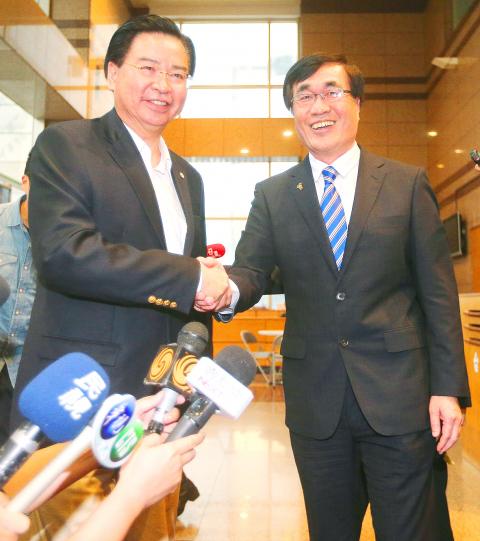The Chinese Nationalist Party (KMT) yesterday rejected an invitation by the Democratic Progressive Party (DPP) to jointly hold a national affairs conference on constitutional reform with other political parties and civic groups, DPP spokesperson Cheng Yun-peng (鄭運鵬) said.
DPP Secretary-General Joseph Wu (吳釗燮) proposed to KMT Secretary-General Lee Shu-chuan (李四川) that all the major political parties and civic groups co-host a national affairs conference to seek consensus on constitutional reform, Cheng said.
Wu was told that the KMT favored the issue being discussed by the legislature’s Constitutional Amendment Committee instead of at a national affairs conference, Cheng said.

Photo: CNA
The DPP will continue to communicate with the KMT about the idea, which is supported by the Taiwan Solidarity Union, the People First Party and civic groups, he said.
“Since issues related to reform to the legislative electoral system are among those put up for discussion regarding constitutional reform, what could be expected from an amendment drafted by the legislature alone?” Cheng said.
KMT spokesperson Lin Yi-hua (林奕華) said that the party does not oppose a national affairs conference, but said that such a conference should be presided over by President Ma Ying-jeou (馬英九), as previous conferences were by former presidents Lee Teng-hui (李登輝) and Chen Shui-bian (陳水扁) when they were in office, and that issues such as cross-strait relations and housing justice should also be on the agenda.
Wu and Lee met for an hour at KMT headquarters in Taipei.
The KMT had expected to discuss constitutional reform with the DPP at the Lee-Wu meeting, but the talks between Lee and Wu did not go beyond the proposed national affairs conference, Lin said.

Seventy percent of middle and elementary schools now conduct English classes entirely in English, the Ministry of Education said, as it encourages schools nationwide to adopt this practice Minister of Education (MOE) Cheng Ying-yao (鄭英耀) is scheduled to present a report on the government’s bilingual education policy to the Legislative Yuan’s Education and Culture Committee today. The report would outline strategies aimed at expanding access to education, reducing regional disparities and improving talent cultivation. Implementation of bilingual education policies has varied across local governments, occasionally drawing public criticism. For example, some schools have required teachers of non-English subjects to pass English proficiency

‘FORM OF PROTEST’: The German Institute Taipei said it was ‘shocked’ to see Nazi symbolism used in connection with political aims as it condemned the incident Sung Chien-liang (宋建樑), who led efforts to recall Democratic Progressive Party (DPP) Legislator Lee Kun-cheng (李坤城), was released on bail of NT$80,000 yesterday amid an outcry over a Nazi armband he wore to questioning the night before. Sung arrived at the New Taipei City District Prosecutors’ Office for questioning in a recall petition forgery case on Tuesday night wearing a red armband bearing a swastika, carrying a copy of Adolf Hitler’s Mein Kampf and giving a Nazi salute. Sung left the building at 1:15am without the armband and apparently covering the book with a coat. This is a serious international scandal and Chinese

TRADE: The premier pledged safeguards on ‘Made in Taiwan’ labeling, anti-dumping measures and stricter export controls to strengthen its position in trade talks Products labeled “made in Taiwan” must be genuinely made in Taiwan, Premier Cho Jung-tai (卓榮泰) said yesterday, vowing to enforce strict safeguards against “origin laundering” and initiate anti-dumping investigations to prevent China dumping its products in Taiwan. Cho made the remarks in a discussion session with representatives from industries in Kaohsiung. In response to the US government’s recent announcement of “reciprocal” tariffs on its trading partners, President William Lai (賴清德) and Cho last week began a series of consultations with industry leaders nationwide to gather feedback and address concerns. Taiwanese and US officials held a videoconference on Friday evening to discuss the

PERSONAL DATA: The implicated KMT members allegedly compiled their petitions by copying names from party lists without the consent of the people concerned Judicial authorities searched six locations yesterday and questioned six people, including one elderly Chinese Nationalist Party (KMT) member and five KMT Youth League associates, about alleged signature forgery and fraud relating to their recall efforts against two Democratic Progressive Party (DPP) legislators. After launching a probe into alleged signature forgery and related fraud in the KMT’s recall effort, prosecutors received a number of complaints, including about one petition that had 1,748 signatures of voters whose family members said they had already passed away, and also voters who said they did not approve the use of their name, Taipei Deputy Chief Prosecutor